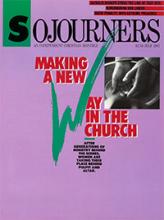A RULE OF LIFE
Sojourners: You have been at the forefront of issues dealing with women in the church, and you've seen the role of women in the church go through a lot of change through the years. But even though the understanding of ministry for women is changing and expanding, women in the Catholic Church are still denied ordination. How do you think this situation will be resolved?
Joan Chittister: You cannot have a changed understanding of the notion of ministry for women until you have a changed understanding of the notion of the personhood of women. The question is simply, what is a woman for?
And the answer is not from biology. It's from Shakespeare. It's Shylock's answer in The Merchant of Venice: "If you prick us, do we not bleed? If you tickle us, do we not laugh? If you poison us, do we not die?" The answer is, "I am fully human. Therefore, I am fully graced by God. Therefore, I am fully called by God."
When they baptize a woman they don't say, "Now we pour this slightly diluted water on this slightly diluted creature who will give us slightly diluted Christianity—or ministry or service—back." When they bring the girl up to confirm her, and she stands next to the little boy who is her peer and colleague in this great Christian moment, they don't tap him on the cheek and say, "You are confirmed to do battle for Christ our Lord and the spreading of the faith," and then look at her and say, "You are almost allowed to do battle for Christ our Lord in faith."
Read the Full Article

